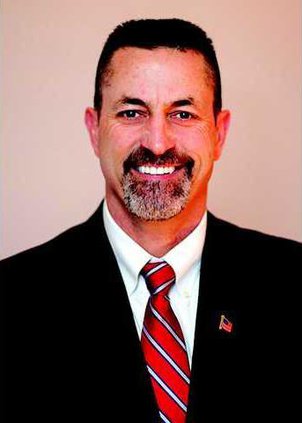MADISON – Lafayette County Sheriff Reg Gill was recently appointed to Governor Scott Walker’s Task Force on Opioid Abuse. Gill is the only sheriff on the task force. His role is to represent law enforcement’s perspective as to what they are seeing and dealing with across Wisconsin in regard to the growing opioid problem.
Other members of the group include leaders of the state departments of corrections, insurance, health services and safety and professional services, along with members from law enforcement, public health, the public and state associations representing doctors, hospitals and pharmacies. It will also include Attorney General Brad Schimel, Sen. Leah Vukmir, R-Brookfield, Sen. Janet Bewley, D-Mason and Rep. Jill Billings, D-La Crosse. The team is led by Lt. Gov. Rebecca Kleefisch and Rep. John Nygren, R-Marinette.
“Obviously I am honored to be the law enforcement representative to this task force,” Gill said. “As a member of the Badger State Sheriff’s Association, it is a valuable opportunity to share concerns and information that other sheriffs from around the state have shared with me to present to task force members.”
Gill said he wasn’t exactly sure why he was chosen out of all of the law enforcement officers in the state. He specifically asked why he was appointed.
“Apparently my having come directly from patrol into office may have had something to do with it,” Gill said. “Also, we have had several opportunities for meetings with Department of Health Services staff members concerning this and several other issues for the last year-and-a-half.”
In 2014, more Wisconsin residents died from drug overdoses than from motor vehicle crashes, and the number of drug overdose deaths in the state doubled from 2004 to 2014. Prescription opioid pain relievers contributed to 47 percent of the 843 drug overdose deaths in 2014, which heroin contributed to 32 percent.
Gill said there has been a fair amount of opioid abuse in Lafayette County. The most common is the abuse of prescription meds.
“We are seeing a steady increase in heroin use and have had a few overdoses,” Gill said. “Nothing like some other counties, such as Dane, who are seeing incredible numbers of overdoses. Many sheriffs have shared with me how this issue has become such a huge problem within their jails, with many cases of withdrawal issues. However, as with any drug abuse problem, it contributes to so many other issues. Increases in burglaries, thefts, domestic disputes, etc… are often contributed to by the need to feed the addictions.”
When looking at a map of Wisconsin counties, Lafayette is considered a meth county and not an opiate county.
“My own personal experience with this problem is rather limited, especially compared to many of the other members, several of which have unfortunately been touched very personally by this problem,” Gill said. “As I explained to the group at the first meeting, after hearing the members share their backgrounds and experiences, I will be taking more away from the meetings to share than I will probably bring to the table.”
He said he is not sure why there is only one law enforcement representative on the task force.
“The sheriffs are very grateful to have been brought to the table to take part in this initiative,” Gill said. “I look forward to see where this Task Force goes as we move forward on this issue that hurts so many individuals and families.”
“While we’ve made great strides to combat opioid abuse in Wisconsin, this task force is a unified effort to help end opioid abuse and overdoses in our state,” Governor Walker said.
The team met for the first time Oct. 28 in Green Bay to discuss where the state is at and where it needs to go to address the problem. They had another meeting Tuesday, Nov. 22 in Weston.
Lafayette County Sheriff on State Drug Task Force Team





